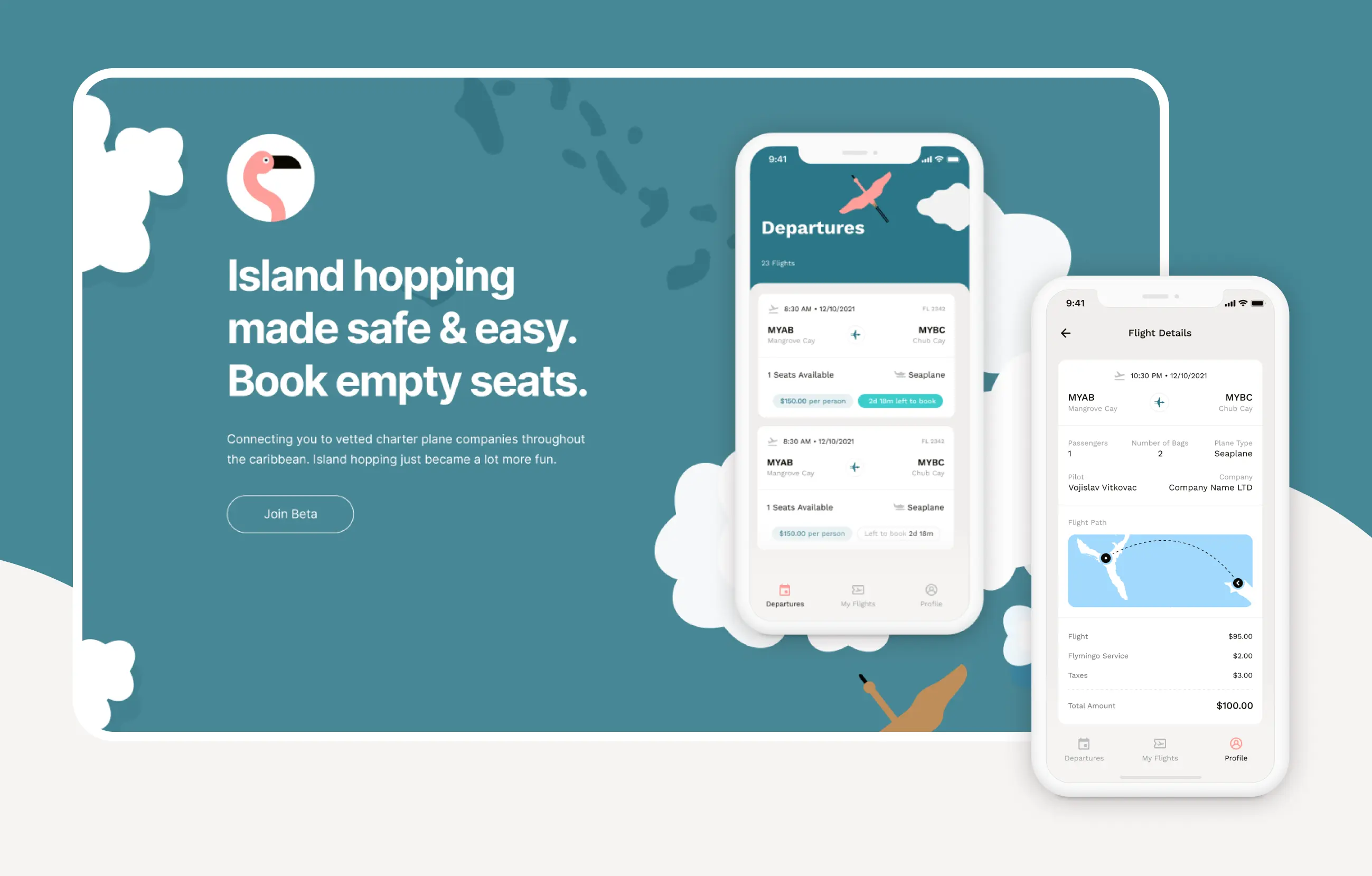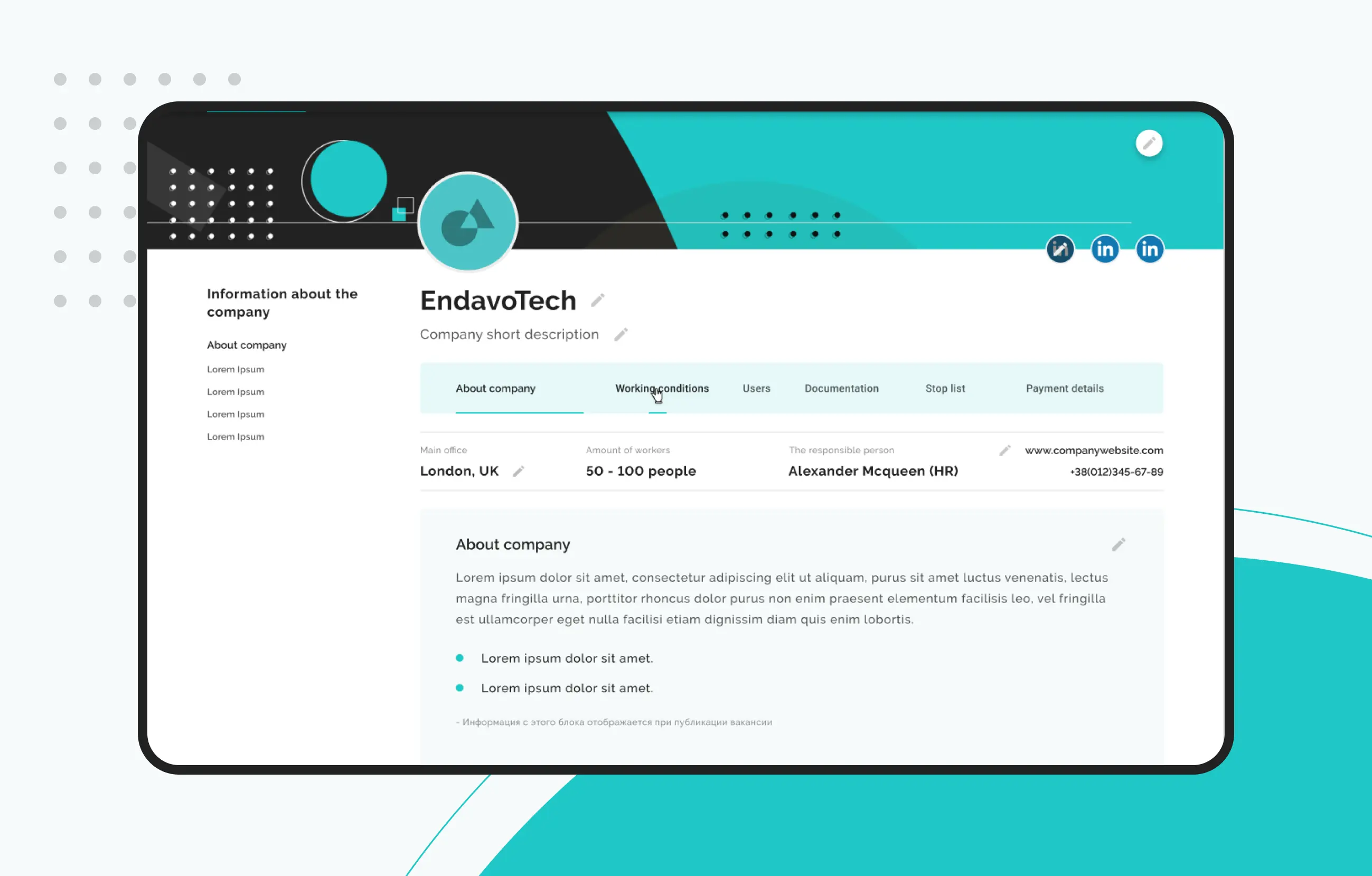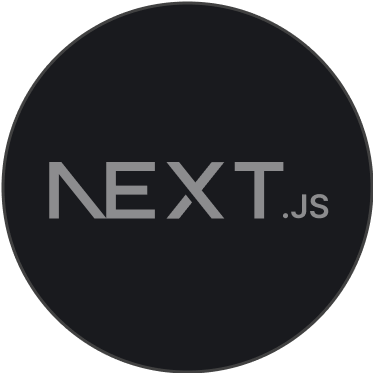Web Development
Mobile Development
UX/UI Design
Staff Augmentation
CTO as a Service
Dedicated Team
Low code development
Web Development
Mobile Development
UX/UI Design
Staff Augmentation
CTO as a Service
Dedicated Team
Low code development
Marketplace Development Company
We help marketplaces grow revenue, increase transaction volume, and improve user retention through data-driven UX/UI design and reliable technical implementation. Our team builds scalable and secure marketplace platforms, ensuring a great experience for buyers and sellers.
We develop both service-based and product-based marketplaces across various industries, including e-commerce, travel, and SaaS. By prioritizing security, scalability, and user experience, we create platforms that effectively align with your business objectives.
Projects delivered by Our Team
Flymingo

An app designed to connect charter flight pilots with clients interested in traveling to the Bahamas.
Mentoly

A service marketplace that connects clients with licensed psychologists for online therapy sessions.
Mebelmarket

An e-commerce platform focused on furniture and sleep products.
Dream Team

Recruiting platform that streamlines candidate search and hiring.
Marketplace Development Services We Offer
Custom UX/UI Design
Our team helps create user interfaces that are both visually appealing and intuitive, making your platform easy to navigate and aligned with your brand.
User Roles and Permissions
We can set up customized user roles for buyers, sellers, and administrators to ensure a well-structured and secure platform.
Secure Payment Systems
We assist in integrating reliable and secure payment gateways to handle transactions smoothly, including support for subscriptions and multiple currencies.
Third-Party Service Integration
Need to connect your platform with other tools or services? We can integrate CRMs, analytics platforms, and more to enhance functionality.
Back-Office Development & User Management
Our team builds CMS and user management systems, providing full control over content, users, permissions, and platform administration.
Data Security
We can implement advanced security features to protect your platform and ensure compliance with industry standards.
Analytics & Reporting
Our team can implement tools to help you and your users access real-time data insights and detailed performance reports.
SEO Optimization
Our specialists can optimize your marketplace platform for search engines, helping you attract more users and grow your business.
Team
Get a detailed marketplace platform proposal in 48 hours.
Collaborate with our team of experts to create a scalable, secure, and user-friendly platform.
Name
Why Choose Our Marketplace Development Services?
1
We’re experts with years of experience
Our team includes only senior and mid-level engineers with an average of 5 years of development experience. With 100+ successful projects, we’re equipped to handle even the most complex challenges.
2
We specialize in Marketplace development
Our team has extensive experience in delivering marketplace solutions across travel, retail, healthcare, e-commerce, and other industries.
3
We use the latest tools and technologies
We work with modern tools like the MERN stack, so your marketplace application will be fast, secure, and built to handle whatever you need.
4
We provide flexible cooperation models
Whether you need a dedicated team, a one-time project, or ongoing support, we provide flexible collaboration options to match your business requirements.
Technologies
Front-end
Back-end
Mobile
Server
CMS
QA
Integrations
Questions You May Have
How to Create an Online Marketplace MVP?
An MVP (Minimum Viable Product) for a marketplace includes only essential features like user registration, product or service listings, search functionality, and a payment system. The goal is to launch quickly, test the idea with real users, and improve based on feedback before scaling.
How Much Does It Cost to Develop a Marketplace App?
The cost of developing a marketplace app depends on the complexity and features. A basic marketplace MVP typically starts at $30,000-$80,000, while a full-featured marketplace with advanced integrations can exceed $150,000.
How Long Does It Take to Build a Marketplace?
Developing a marketplace MVP usually takes 3-6 months. More complex platforms with custom features, multiple integrations, and advanced security may require 6-12 months or longer.
How Does a Marketplace Business Model Work?
A marketplace connects buyers and sellers, handling transactions and earning revenue through commissions, subscription fees, listing fees, or premium services. The business model depends on the type of marketplace, industry, and target users.
We would love to help.
What are you interested in:
Name
Phone
Tell us about your project and goals
0/1000
Add your file
How to Build an Online Marketplace: Core Features
In today's digital world, online marketplaces have changed the way we provide services. An online marketplace serves as an independent online-based platform that connects buyers and sellers for the exchange of goods and services.
While many of us are familiar with major players in the market like Amazon and eBay, some businesses are getting ahead of their competitors by building their own niche-focused marketplace. Such platforms not only offer new avenues for sales and optimize pricing but also cultivate convenient ecosystems where users can access a wide range of products and services.
According to Statista, the share of e-commerce sales is projected to continue growing each year. Consequently, this trend prompts numerous companies to allocate significant resources toward developing their own e-commerce platforms.
Understanding Marketplace Development
Developing a marketplace platform requires a tailored approach, focusing on specific needs across various industries. So, what exactly goes into building one? Key components of marketplace development include:
- Discovery Phase: Researching and analyzing the market landscape, competitors, and target audience to identify niche opportunities and ensure product-market fit.
- UX Development: Designing the user experience to create an intuitive and seamless interface for users.
- UI Design: Crafting the user interface to enhance usability and visual appeal.
- Technical Architecture: Developing the project architecture involves creating a structured framework that addresses all specific requirements and limitations (such as selecting suitable technologies, defining data architecture, planning data storage, management , etc.).
- Functionality Implementation: Developing and integrating the necessary features and infrastructure to support marketplace operations.
- Iterative Updates and Scaling: Continuously updating and improving the marketplace based on user feedback and scaling it to accommodate a growing user base and demands.
Marketplace functionality includes essential features like a comprehensive product catalog, user accounts, CRM/ERP integration, real-time chat, secure payment systems, and admin panels.
In the commerce landscape, marketplace platforms prioritize personalized experiences for customers and providers. Integrating technologies like AI and blockchain enables innovative services such as smart recommendations and secure payments. E-commerce platforms expand business reach while offering consumers convenience, reflecting their crucial role in the digital economy.
Key Aspects of Marketplace Design
Creating a successful marketplace platform goes far beyond its basic functions. This involves understanding the audience, matching branding and design with market expectations, and creating a smooth user experience.
Here are a few things to consider:
- UX/UI Design Best Practices: Implementing UX/UI design starts with strategizing functionality based on market offerings and analyzing the target audience. User flows and functionality are carefully considered in this process. Creating wireframes is essential for testing ideas, evaluating changes, and ensuring the solution's convenience and usability.
- Responsive Design: Ensuring multi-device accessibility through responsive design guarantees excellent navigation and adaptation to various screen sizes and orientations.
- Establishing a Marketplace Brand Identity: Building a strong brand identity sets you apart from competitors, enhances customer loyalty and recognition, and attracts new users to your platform.
Marketplace app design plays a crucial role in shaping user engagement and long-term success. By prioritizing user-centric design strategies and implementing responsive design principles, e-commerce platforms can significantly enhance their customer appeal and drive sustained growth.
Core Technologies for Marketplace App Development
In the current market environment, there's a wide range of platforms available for building a marketplace. These platforms span from established product companies with their own offerings to specialized companies adept at tailoring software solutions to individual clients.
While off-the-shelf solutions may offer convenience, custom development often proves necessary to meet specific requirements and ensure optimal functionality.
The backbone of many high-traffic marketplaces relies on carefully selected technologies. Custom development necessitates modern solutions that are continuously maintained and updated to meet evolving needs, such as the MERN stack, a popular combination for website development.
This stack includes MongoDB for flexible and scalable data management, Express.js for rapid development of secure APIs, React JS/Next JS for building user interfaces, and Node.js for creating scalable network applications.
There are also specific fundamental criteria that all marketplaces must meet:
- Scalability:Marketplace websites must be scalable to accommodate increased user loads as the platform gains popularity. High performance ensures seamless user experiences, especially during peak usage periods.
- Flexibility:The technology stack supporting the marketplace should be flexible enough to adapt to user flows and seamlessly integrate new features. Easy integration of new functionalities is vital to meet evolving user needs and preferences.
- Security:Security is paramount for any online marketplace, given its handling of sensitive user information. Robust security measures are necessary to safeguard confidential data and protect users from potential threats or breaches.
- Search Engine Optimization (SEO):Enhancing the marketplace's visibility in search engine results is crucial for attracting organic traffic.
- Website Performance:The speed and performance of the website significantly impact user experience. Ensuring fast loading times and smooth functionality enhances user satisfaction and encourages continued engagement with the platform.
Key Considerations in B2B Marketplace Development
Preparing for marketplace development involves several key steps, such as market research, defining a business model, and selecting suitable trade models. Each sales model has its unique characteristics, including marketing strategies, budgets, documentation, and customer communication.
B2B (Business-to-Business) is a business model where one company sells goods or services to another, with both parties aiming for business development and mutual benefit. Purchases in the B2B market are often for resale, production, or specific tasks.
Service marketplaces deserve special mention here. These can be platforms for freelancers or gig economy workers (such as Upwork, Fiverr), as well as booking and scheduling platforms (like Airbnb, Setmore).
Many of them operate on a peer-to-peer (P2P) basis, connecting individuals offering goods or services with those looking to buy or rent them. Thus, launching an online marketplace doesn't necessarily require substantial investments.
The peculiarity of the "business-to-business" niche requires a thorough understanding of the project's goals and the target audience's demands. B2B websites are complex, multi-page projects that must address a variety of tasks. This includes facilitating effective communication between two companies, their managers, specialists, and accounting systems.
What is the difference between B2B and B2C solutions?
The distinction between B2B and B2C marketplaces lies primarily in their target audience. B2B platforms are tailored for corporate clients, whereas B2C platforms target individual consumers.
This fundamental distinction leads to several other differences. For example, B2B marketplaces typically involve more complex trading and financial transactions, handle larger order volumes, and serve more demanding and rational customers. On the other hand, B2C marketplaces appeal more to emotional and impulsive buyers.
How to Choose the Right Marketplace Developers?
It is crucial to start your product development journey with solid research, and hiring the right team is the first step. Your decision should be guided by factors such as budget, technical proficiency, desired level of involvement in the development process, and communication preferences.
When choosing e-commerce marketplace developers, expertise in digital commerce solutions and previous experience with marketplaces are key considerations.
At Stubbs.pro, we excel in both areas. With a proven track record in developing successful marketplaces and deep knowledge of modern tech stacks suitable for marketplace development, we deliver projects efficiently and with high quality. Leveraging our expertise and using scalable technologies ensures rapid development and effective scalability for your marketplace.
Conclusion
Digital marketplaces can be safely called the future of retail. They bridge the gap between providers and customers worldwide in seconds, opening doors to vast opportunities. Marketplace development requires careful planning and strategic partnerships. Choosing the right approach and partners can significantly impact the success and growth of your marketplace.
Ready to kickstart your marketplace journey and maximize revenue potential? Contact us at Stubbs.pro. With our e-commerce expertise and extensive experience in marketplace development, we guarantee efficient project delivery and exceptional performance.

-1747731627136.png)
-1749023935755.png)


-1747731983305.png)

-1747732042514.png)

-1747732097673.png)

-1747732122263.png)

-1747732160762.png)

-1747732191631.png)